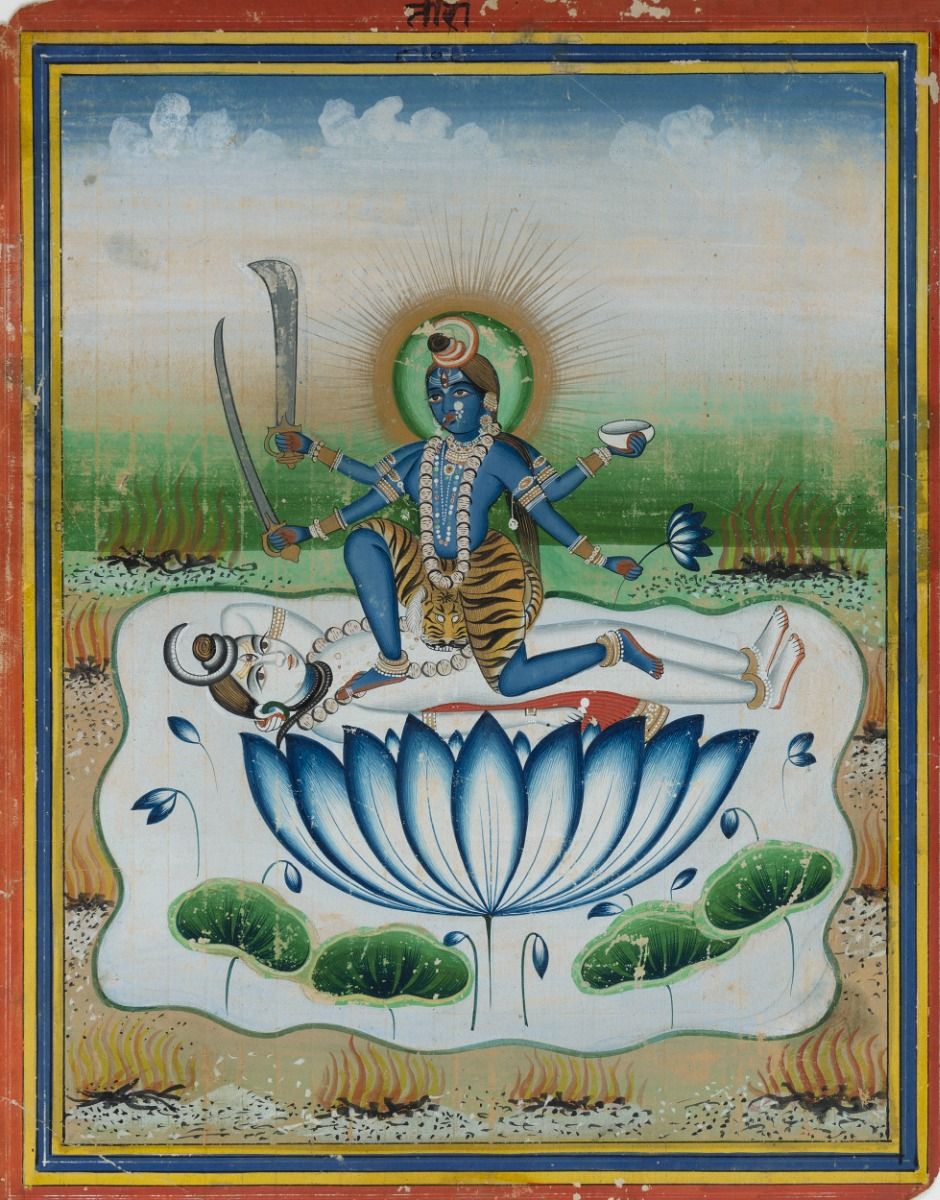Maa Kali
करालवदनां घोरां मुक्तकेशीं चतुर्भुजाम् ।
कालिकां दक्षिणां दिव्यां मुण्डमाला विभूषिताम् ॥ १॥
karālavadanāṃ ghorāṃ muktakeśīṃ caturbhujām |
kālikāṃ dakṣiṇāṃ divyāṃ muṇḍamālā vibhūṣitām ||
Source: Dakshina Kali dhyana mantra from Shri Dakshinakali Khadgamala stotram
Maa Tara
प्रत्यालीढपदां घोरा मुण्डमाला विभूषिताम् ।
खर्वां लम्बोदरी भीमां व्याघ्रचर्मावृतां कटौ ॥ १ ॥
pratyālīḍha-padāṃ ghorā muṇḍamālā vibhūṣitām ।
kharvāṃ lambodarī bhīmāṃ vyāghra-carm-āvṛtāṃ kaṭau ॥ 1 ॥
I meditate on Maa Tara , her left foot forward and right foot back, adorned with garland of skulls, Her warrior pose terrifying Short, pot bellied and terrifying, She dons a tiger skin around her waist.
She stands with her left foot forward, gracefully embodying the sacred path of the left-hand Tantra, her divine form radiating both terror and majesty. Around her neck hangs a garland of skulls, each one symbolizing the syllables of the Sanskrit alphabet—the very vibrations from which all of Creation springs. Though she appears short and pot-bellied, this is but a reflection of her boundless nature, for the entire universe dwells within her. Her form, seemingly awkward to the limited eye, reveals her true essence—subtler than the subtlest, beyond ego and beyond the reach of the senses. She wears a tiger skin around her waist, signifying her fearless might and swift compassion in answering the sincere prayers of her devotees. It is also a testament to her mastery over rajas, the restless force of passion. O Mother, fierce and compassionate, you are both the origin and the refuge of all that is.
Maa Tripur Sundari
आरक्ताभांत्रिनेत्रामरुणिमवसनां रत्नताटङ्करम्यां
हस्ताम्भोजैस्सपाशाङ्कुशमदनधनुस्सायकैर्विस्फुरन्तीम् ।
āraktābhāṃtrinetrāmaruṇimavasanāṃ ratnatāṭaṅkaramyāṃ
hastām bhojaissapāśāṅkuśamadanadhanussāyakairvisphurantīm |
Source: Dhyana shloka from Khadagmala Strotram
Maa Bhuvaneshwari
सिन्दूरारुण-विग्रहां त्रि-नयनां माणिक्य मौलि स्फुरत्
तारानायक-शेकरां स्मितमुखीं आपीन वक्षोरुहाम्।
sindūrāruṇa-vigrahāṃ tri-nayanāṃ māṇikya mauli sphurat
tārānāyaka-śekarāṃ smitamukhīṃ āpīna vakṣoruhām|
Source: Dhyana shloka from Lalita Sahasranam

Leave a Reply